Pastoral counties of northern Kenya are expected to undergo massive change in the coming years due to the government’s ambitious infrastructural development agenda. However, the area frequently experiences violence as a result of conflict between pastoralist communities, and also due to ethno-political contestations. Isiolo County is one such place where planned development projects and conflict risks coincide, making it an important case study for understanding how the future may unfold.
Kennedy Mkutu Agade, PhD (United States International Univeristy), partner of the CRC sub-project B03, recently contributed to the BICC working paper series. His paper entitled “Pastoralists, politics and development projects. Understanding the layers of armed conflict in Isiolo County (Kenya)” is available from the Website of the Bonn International Center for Conversion (BICC) here.
This Working Paper is written in the framework of a larger project called “Future Rural Africa: Future-making and social-ecological transformation” by the Universities of Bonn and Cologne and BICC (Bonn International Center for Conversion). BICC is interested in the kinds of claims that are being made on land and its resources and how these may change the existing dynamics of organised violence. The Paper explores the complexity of existing conflict in Isiolo and the emerging effects of new plans and land claims. At its most basic level, conflict between pastoral groups, or between pastoralists and farmers is motivated both by survival (pastoral mobility and access to water and pasture in a climatically challenging area) and the accumulation of livestock wealth. Politics, which is generally extended along ethnic lines, adds another layer to the inter-communal conflict through the need for political survival and the accumulation of personal wealth. The devolution of many powers and budgets to county level since 2013 has then raised the stakes for political power. Since plans for infrastructure have been made known, tensions have emerged, and fears of exclusion and dispossession of customary land users through speculative land-grabbing and uncompensated state acquisition. With Isiolo being a hub of the illicit small arms trade, guns have become a conflict multiplier at every level.
The county is highly securitised with several specialised police units. However, they lack capacity and their actions have tended to be either inadequate or overly reactive and their relationship with communities is poor. As a result, day to day security of pastoralist communities and their livestock relies on the rather informal and unprofessional National Police Reserve, who are armed by the state, and community members, who purchase their own arms through illicit markets. Politicians on occasion have also supplied arms and ammunition to communities. The Paper concludes that the various layers of conflict should be considered and addressed simultaneously, and that development is a new and potent factor in conflict at both political and community levels. A careful, inclusive conflict-sensitive approach to development is essential, but this is unlikely to happen if leaders look for personal power and gain






